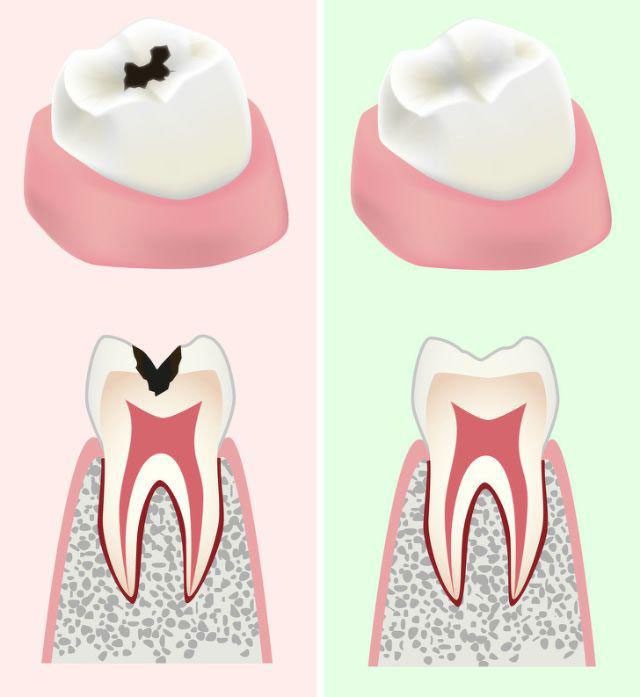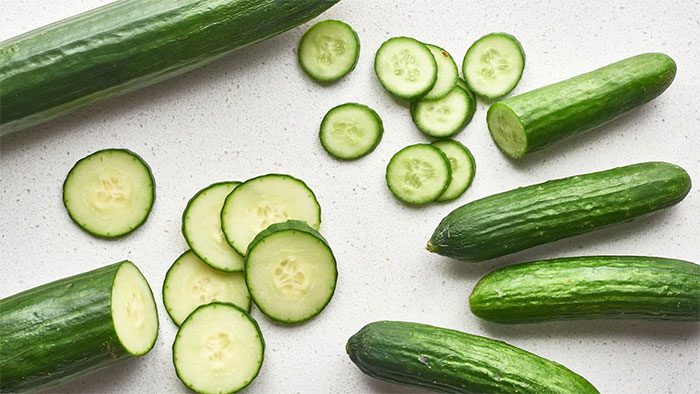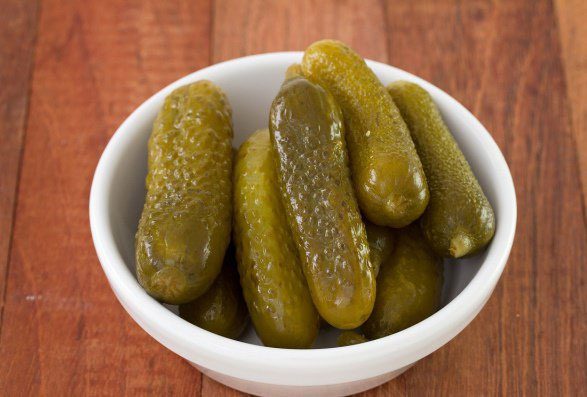Nature always gives humanity precious yet abundant gifts. Did you know that a type of fruit that is both affordable and easily accessible can be incredibly beneficial? Let’s explore the miraculous benefits of cucumbers in the article below.
Benefits of Eating Cucumbers
- 1. Protects the body from neurological diseases
- 2. Promotes rapid weight loss
- 3. Reduces the risk of cancer
- 4. Improves digestive issues
- 5. Provides internal hydration
- 6. Nourishes soft, smooth skin
- 7. Improves hair health
- 8. Enhances cardiovascular health
- 9. Better blood sugar control
- 10. Supports bone development
- 11. An effective and affordable detox method
- 12. Improves oral health
- 13. Balances hormone levels
- 14. Helps combat alcohol addiction
- 15. Prevents tumor formation in the body
- 16. Keeps breath fresh
- 17. Helps lower blood pressure
- 18. Reduces bloating
- 19. Contains antioxidants
- Cautions When Eating Cucumbers
- 1. Do not eat heated cucumbers
- 2. Avoid cucumbers if you have stomach or kidney issues
- 3. Do not combine cucumbers with foods high in vitamin C
- 4. Avoid eating cucumbers with tomatoes
- 5. Do not eat cucumbers with chili or celery
- 6. Limit intake of pickled cucumbers
- 7. Avoid cucumbers with peanuts
- 8. Do not eat cucumbers with mushrooms
Since ancient times, cucumbers have been used in India as both a food and an effective medicinal remedy. In a hot climate like India, cucumbers help hydrate and moisturize the body of the consumer. Of course, this is not the only benefit that this fruit provides.
1. Protects the Body from Neurological Diseases

The fisetin present in cucumbers has been recognized for its role in improving brain health. Additionally, cucumbers contain phosphorus, which is essential for the body. A deficiency in phosphorus significantly increases the risk of cognitive diseases. Therefore, eating cucumbers will undoubtedly enhance your brain’s function and focus.
2. Promotes Rapid Weight Loss

The high water content in cucumbers helps achieve satiety quickly, thereby controlling portion sizes. Cucumbers are a fat-free fruit with very few calories, making them an excellent choice for anyone trying to achieve their dream body.
3. Reduces the Risk of Cancer

Once again, fisetin – a flavonoid that has garnered much attention from cancer researchers. Besides its antioxidant and anti-inflammatory properties, fisetin found in cucumbers can lower the risk of certain types of cancer.
4. Improves Digestive Issues

Cucumbers contain fiber and a significant amount of water, which aids in improving the digestive system. The vitamins in cucumbers also contribute to enhancing digestive function. Consuming a cucumber daily can resolve issues related to bowel movements, thereby improving nutrient absorption in the body.
5. Provides Internal Hydration

Comprising 95% water, consuming cucumbers daily significantly enhances the overall water level in the body. This is a highly positive impact. If you often forget to drink water or find it bland, try replacing it with a cucumber instead.
6. Nourishes Soft, Smooth Skin

Cucumbers help increase moisture levels in the body, keeping the skin hydrated. Additionally, this fruit contains B vitamins such as niacin and riboflavin, along with vitamin C and zinc, which are essential for maintaining healthy skin. Cucumbers also contain caffeic acid, which helps reduce skin irritation and inflammation. The nutrients in cucumbers can even combat the signs of skin aging.
7. Improves Hair Health

The B vitamins found in cucumbers are beneficial for the health of the scalp and hair. Biotin, riboflavin, niacin, B5, B6, and C all promote rapid hair growth. They also play a crucial role in preventing hair loss and premature graying.
8. Enhances Cardiovascular Health

Cucumbers contain potassium, magnesium, and vitamin K. These three nutrients are essential for the smooth functioning of the cardiovascular system. Vitamin K plays a vital role in blood clotting and regulating calcium levels in the blood. Lower levels of magnesium and potassium can lead to higher blood pressure. Regularly consuming an adequate amount of cucumbers can also lower bad cholesterol levels.
9. Better Blood Sugar Control

Cucumbers contain various phenolic compounds, flavonoids, and triterpenes. According to researchers, increasing cucumber intake is likely to help control elevated blood sugar levels.
10. Supports Bone Development

Cucumbers are rich in vitamin K and calcium, both essential for strong bones. Vitamin K has been recognized for its ability to reduce the risk of fractures while also aiding calcium absorption in the bones.
11. An Effective and Affordable Detox Method

Many believe that cucumbers have natural detoxifying properties. If you regularly consume this fruit, your body will expel impurities and toxins from the liver and intestines, leading to better overall health.
12. Improves Oral Health

Cucumbers contain molybdenum and fluoride, a perfect combination for repairing tooth decay. The calcium content in this fruit also helps strengthen tooth enamel.
13. Balances Hormone Levels

Phosphorus is an essential nutrient for hormonal balance in the body. It interacts with endocrine glands to regulate and release hormones. Cucumbers contain about 4% of the daily hormone intake that adults should consume.
To reap all the benefits of cucumbers, incorporate them into your daily diet. You can eat them as is, mix them in salads, or juice them. Remember to choose fresh cucumbers that are pesticide-free.
14. Helps Combat Alcohol Addiction
Cucumbers are rich in arginine, alanine, glutamine, and other compounds that can provide certain supportive treatments for liver patients, especially those suffering from alcohol-related liver disease, and may help prevent alcohol addiction to some extent.
15. Preventing Tumor Formation in the Body

Cucurbitacin C in cucumbers has the ability to inhibit tumor formation to a certain extent.
Cucumbers contain cucurbitacin C, which can inhibit tumor formation to some extent and enhance the body’s immune function. Additionally, this compound may also help treat chronic hepatitis and prolong the life of patients with primary liver cancer.
However, we often overlook the abundant amount of cucurbitacin found in cucumbers. This is because cucurbitacin contributes to the bitter flavor of the cucumber, and we tend to discard this part. Therefore, when eating cucumbers, do not waste this beneficial substance for health, as the saying goes, “bitter medicine cures the disease.”
16. Keeping Breath Fresh
“Cucumbers help cure bad breath thanks to their water content, fiber, and photochemical properties,” nutrition expert Johna Burdeos told Eat This Not That.
She explained, “Cucumbers are made up of over 95% water, making them an excellent hydrating food for the body. Dry mouth is a common cause of bad breath because saliva helps wash away bacteria in the mouth. When you’re dehydrated, your mouth produces less saliva, leading to bad breath. Eating cucumbers helps hydrate the mouth, increase saliva production, and wash away bacteria.”
Moreover, cucumbers contain phytochemicals, such as polyphenols and flavonoids, which have antioxidant properties. These compounds help reduce the amount of bacteria that cause bad breath.
17. Helping Lower Blood Pressure
A 2017 study from the Public Health of Indonesia found that blood pressure decreased after consuming cucumber juice.
The study involved 20 participants aged 60 and older with high blood pressure. Participants drank the juice of one cucumber mixed with water twice a day for seven days. It showed a “significant effect” of cucumber juice on lowering blood pressure in this age group.
18. Reducing Bloating
Cucumbers are an ideal solution to avoid bloating, partly due to their high potassium content.
Nutritionist Lauren Manaker stated, “The potassium in cucumbers helps reduce bloating by decreasing water retention. If someone is bloated due to constipation, eating cucumbers with the skin on can enhance fiber intake, further alleviating bloating.”
19. Rich in Antioxidants
Antioxidants are molecules that prevent oxidation, a chemical reaction that creates highly reactive atoms known as free radicals.
The accumulation of these harmful free radicals can lead to various chronic diseases. In fact, oxidative stress caused by free radicals is linked to cancer, heart disease, lung disease, and autoimmune diseases.
Cucumbers contain antioxidants, including flavonoids and tannins, which help prevent the buildup of harmful free radicals, reducing the risk of chronic diseases.
Cautions When Eating Cucumbers
1. Do Not Eat Cooked Cucumbers
First and foremost, remember that cucumbers should only be eaten raw; they are not suitable for frying or heating in any form. This action can destroy many of the nutrients present in cucumbers and may even harm the body.
Additionally, if you consume cucumbers raw, make sure to peel them. The outer skin can come into contact with many harmful bacteria, and eating it can increase the risk of illness.
2. Avoid Cucumbers If You Have Stomach or Kidney Issues

Cucumbers have a cooling property, and consuming too many can lead to frequent urination, which may harm the kidneys.
While cucumbers are suitable for all ages, they are not recommended for individuals with stomach or kidney diseases. According to traditional medicine, cucumbers have a cooling property, and eating too many can lead to increased urination, potentially harming the kidneys. Particularly, those with a cold stomach or stomach issues should avoid eating cucumbers on an empty stomach to prevent worsening pain.
3. Do Not Eat Cucumbers with Foods High in Vitamin C
When consuming cucumbers, it’s best not to pair them with foods high in vitamin C, such as tomatoes and broccoli. This is because cucumbers contain an enzyme that can break down vitamin C, which may lead to a deficiency in the nutrient intake.
4. Do Not Eat Cucumbers with Tomatoes
We often combine cucumbers and tomatoes in salads. However, this is a mistake. Cucumbers contain an enzyme that can decompose vitamin C, while tomatoes are rich in this vitamin. Combining them reduces vitamin C absorption, meaning the nutritional benefits of the dish are not fully realized.
5. Avoid Eating Cucumbers with Peppers or Celery
Peppers and celery are also high in vitamin C. Consuming cucumbers with these vegetables can allow the enzymes in cucumbers to destroy vitamin C content. While this combination isn’t harmful, it may reduce the body’s absorption of vitamin C.
6. Do Not Consume Excess Pickled Cucumbers

Individuals with digestive issues or high blood pressure should avoid pickled cucumbers.
Pickled cucumbers are salty and contain nitrosamines, making them unsuitable for individuals with liver disease, cardiovascular issues, or digestive problems and high blood pressure.
7. Do Not Eat Cucumbers with Peanuts
These two foods should not be combined, as the cold nature of the dish can lead to diarrhea and stomach pain. While those with good digestion may not experience issues, it’s best for those with sensitive stomachs to avoid this combination to prevent diarrhea. Additionally, avoid pairing cucumbers with mushrooms.
8. Do Not Eat Cucumbers with Mushrooms
Mushrooms are nutritious foods rich in B and D vitamins and fiber. Eating mushrooms can help detoxify the body and promote healthy skin and heart. However, frequently combining mushrooms with cucumbers not only diminishes the benefits of both foods but can also be harmful to health.




















































